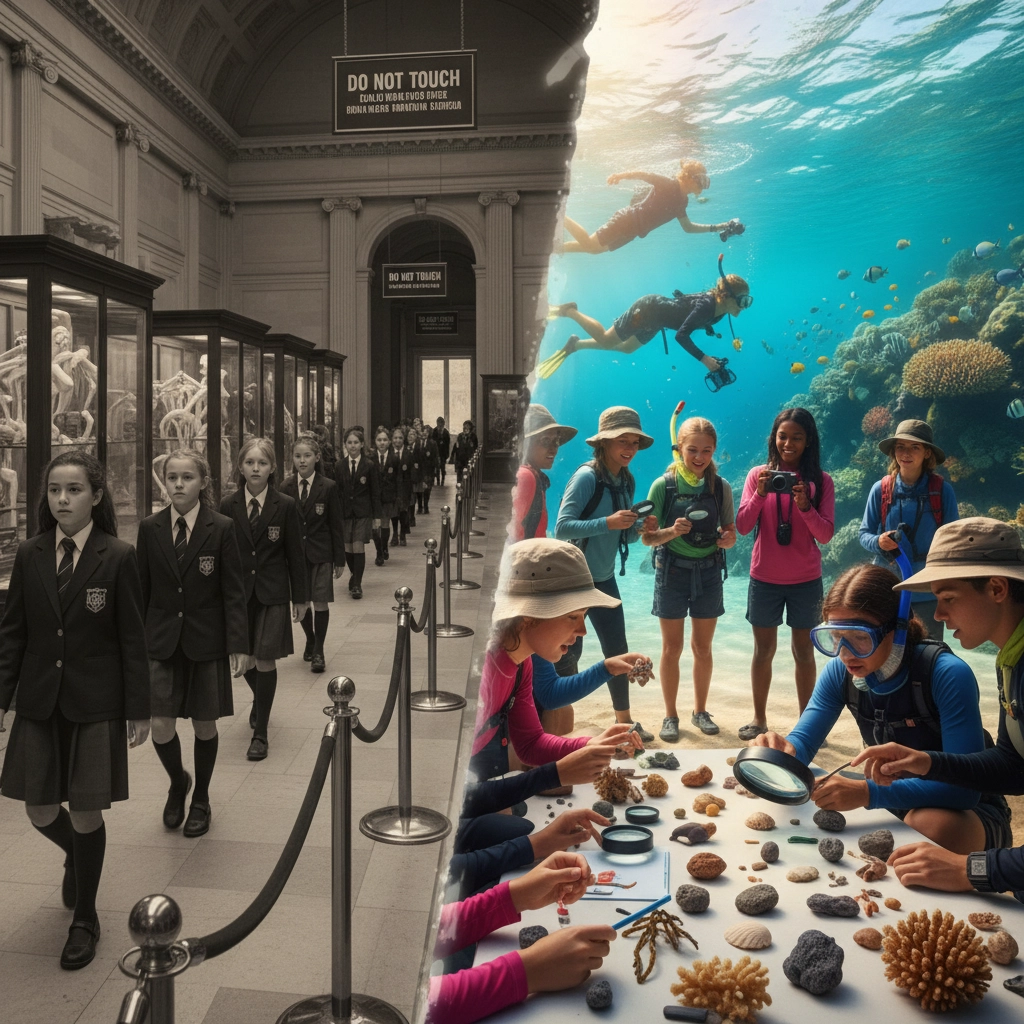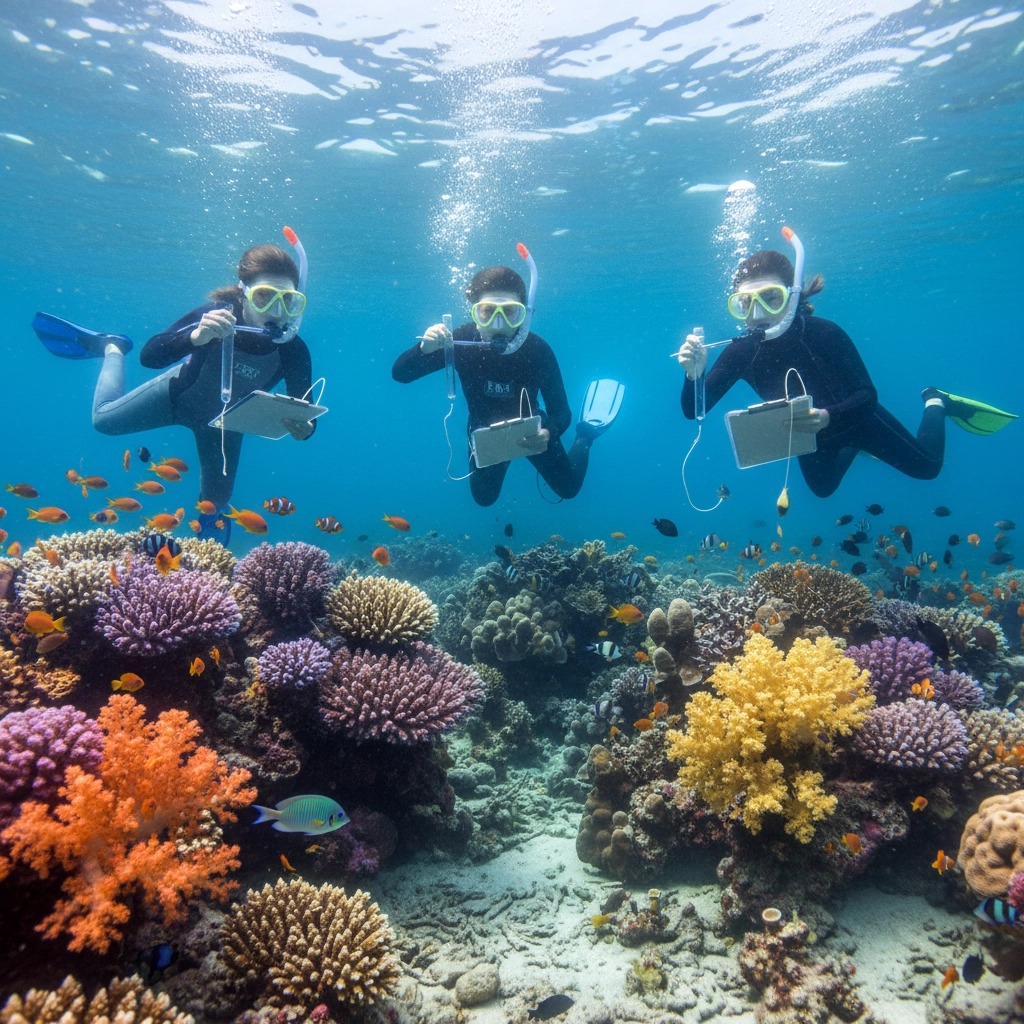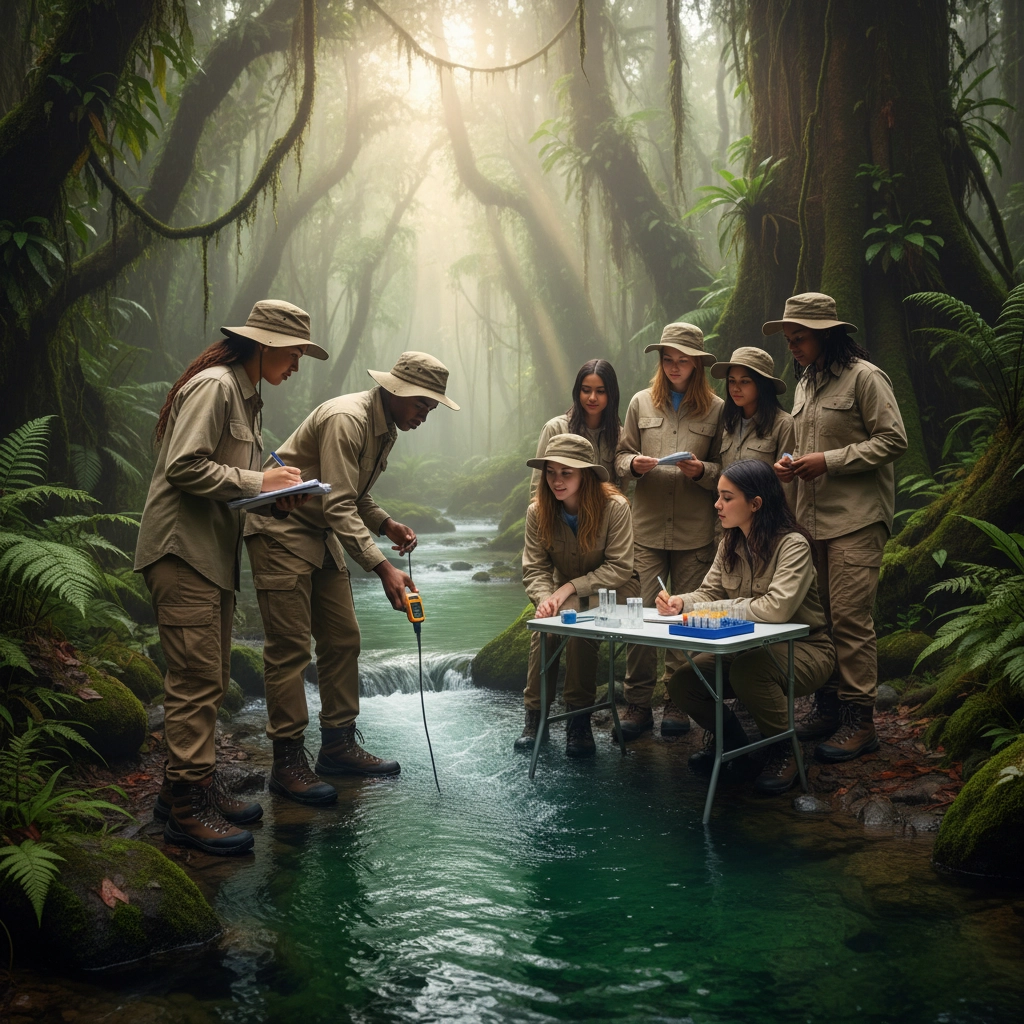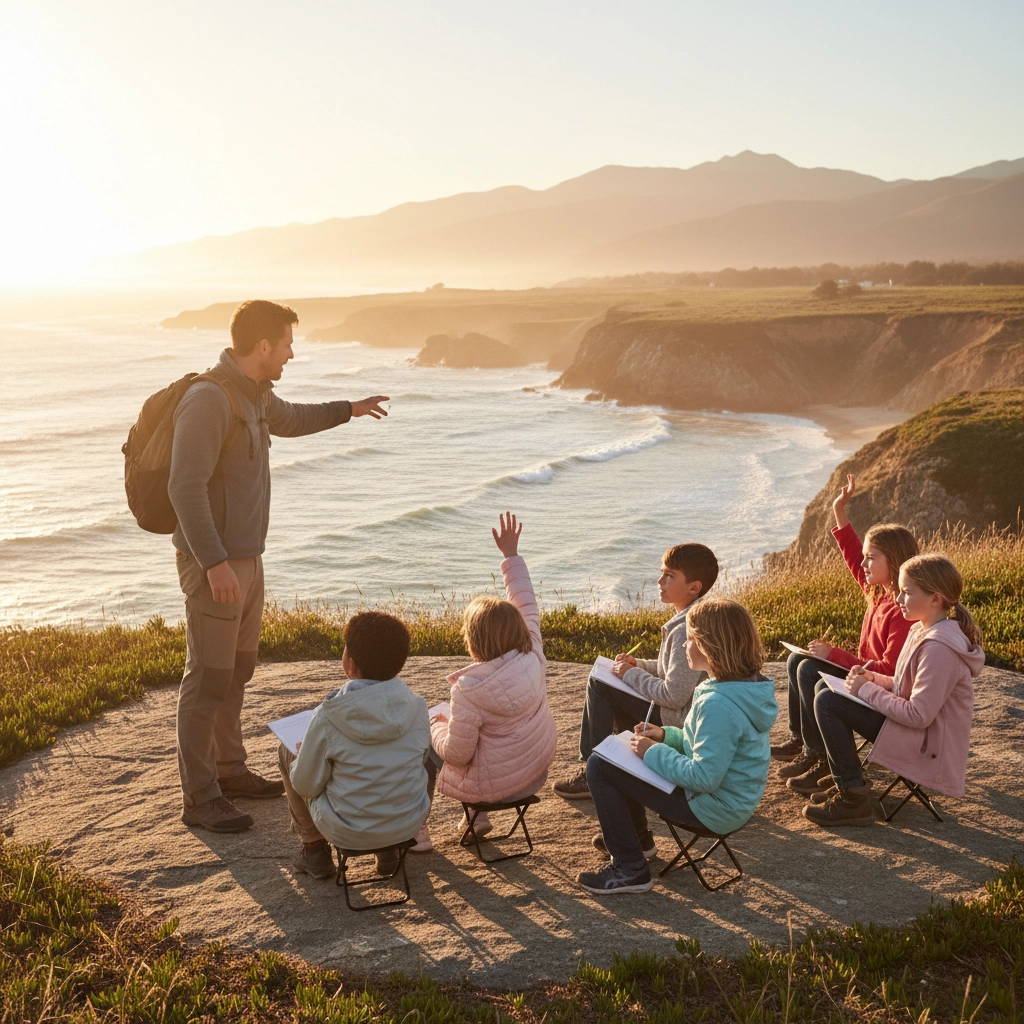Are Traditional Field Trips Dead? Why Hands-On Learning Trips Are Transforming Student Education in 2025
- Caleb Mullenix
- Oct 20, 2025
- 6 min read
Traditional field trips are not dead: they are being revolutionized. The one-day museum visits and zoo excursions of the past are rapidly giving way to immersive, multi-day expeditions that transform how students learn, engage, and connect with the world around them. In 2025, educators are discovering that hands-on learning experiences deliver educational outcomes that far exceed what traditional classroom settings can achieve.
Research demonstrates that students participating in experiential learning trips show a 40% increase in classroom engagement compared to their peers who rely solely on traditional instruction methods. This transformation represents a fundamental shift in educational philosophy, moving from passive observation to active participation, from surface-level exposure to deep, meaningful connections with subject matter.
The Evolution of Educational Travel: From Tours to Transformative Experiences
The educational travel landscape has undergone a dramatic transformation over the past decade. Traditional field trips typically involved large groups of students moving through predetermined locations with limited interaction and minimal educational depth. These experiences, while valuable, often failed to create lasting learning connections or inspire genuine curiosity.

Modern educational expeditions prioritize small group sizes, extended engagement periods, and hands-on activities that require active student participation. Instead of observing marine life through aquarium glass, students now snorkel in protected coral reefs, collect data samples, and work alongside marine biologists to understand ecosystem dynamics. This approach transforms students from passive observers into active researchers and environmental stewards.
The shift toward experiential learning addresses critical gaps in traditional educational approaches. Students no longer simply visit historical sites: they participate in archaeological digs, analyze primary source documents, and engage with local communities to understand historical events from multiple perspectives. This immersive approach creates emotional connections that enhance knowledge retention and inspire lifelong learning interests.
Why Hands-On Learning Outperforms Traditional Approaches
Educational research consistently demonstrates that hands-on learning experiences create superior educational outcomes across multiple dimensions. Students who participate in experiential learning trips show significant improvements in critical thinking skills, collaborative abilities, and subject matter comprehension compared to peers who receive only classroom-based instruction.
The effectiveness of hands-on learning stems from its ability to engage multiple learning modalities simultaneously. When students collect water samples in Costa Rican rainforests, they engage visual, kinesthetic, and analytical learning processes while developing practical scientific skills. This multi-sensory engagement creates stronger neural pathways and improves long-term knowledge retention.
Furthermore, experiential learning develops essential 21st-century competencies that traditional classroom instruction struggles to address. Students working together to navigate unfamiliar environments develop problem-solving abilities, communication skills, and cultural awareness that prepare them for an increasingly interconnected global society. These experiences build confidence and independence while fostering respect for diverse perspectives and environments.

Real-World Applications: How Modern Programs Create Learning Connections
Contemporary educational travel programs integrate rigorous academic content with authentic real-world applications. Marine biology expeditions to the Florida Keys combine classroom preparation with hands-on research activities, allowing students to contribute to ongoing scientific studies while developing practical research skills.
Students participating in these programs engage in activities that mirror professional scientific practices. They design experiments, collect and analyze data, present findings to peers, and collaborate with researchers from universities and conservation organizations. This authentic engagement creates understanding that extends far beyond textbook knowledge, inspiring many students to pursue careers in environmental science and marine biology.
Historical and cultural programs follow similar principles, immersing students in authentic environments where they can explore primary source materials, interact with local communities, and experience historical events through multiple perspectives. Students studying Civil Rights history walk the same paths as historical figures, examine original documents, and engage with community members who witnessed historical events firsthand.
The Science Behind Experiential Learning Success
Neuroscience research reveals why hands-on learning experiences create superior educational outcomes. The human brain forms stronger memory connections when information is processed through multiple sensory channels and emotional experiences. Traditional field trips often fail to create these conditions, resulting in limited retention and minimal long-term educational impact.
Experiential learning trips create optimal conditions for memory formation and knowledge retention. Students experiencing new environments, facing novel challenges, and working collaboratively activate multiple brain regions simultaneously. This neurological engagement creates robust memory networks that support long-term learning and knowledge transfer to new situations.

Additionally, experiential learning reduces the artificial barriers between academic subjects that traditional classroom instruction often reinforces. Students studying marine ecosystems simultaneously engage with biology, chemistry, geography, environmental science, and conservation ethics. This interdisciplinary approach mirrors real-world problem-solving and prepares students for complex challenges they will face in their academic and professional futures.
How Educational Travel Companies Are Leading the Transformation
Forward-thinking educational travel companies are pioneering innovative approaches that maximize learning outcomes while ensuring student safety and engagement. These organizations work closely with educators to design programs that align with curriculum standards while providing authentic, transformative experiences.
Modern educational travel programs prioritize small group sizes to ensure personalized attention and meaningful engagement opportunities. Expert guides with specialized knowledge facilitate deep learning experiences rather than simply providing superficial information. Students receive comprehensive pre-trip preparation and post-trip reflection activities that enhance learning retention and integration.
Appleseed Expeditions exemplifies this transformation through programs that combine rigorous academic content with authentic experiential learning opportunities. Their marine biology expeditions immerse students in scientific research while developing environmental stewardship values. Students work alongside professional researchers, contribute to ongoing studies, and develop skills that prepare them for advanced academic and professional opportunities.
Technology Integration: Enhancing Rather Than Replacing Physical Experiences
Contemporary educational travel programs strategically integrate technology to enhance rather than replace hands-on experiences. Students use sophisticated equipment to collect environmental data, document observations through digital photography, and connect with experts around the world through virtual conferencing.
This technology integration amplifies learning opportunities while maintaining the irreplaceable value of physical presence and direct engagement. Students analyzing water quality in pristine environments use digital tools to enhance their understanding while experiencing the sights, sounds, and sensations that virtual alternatives cannot replicate.
The balanced integration of technology and hands-on experience creates learning opportunities that neither approach could achieve independently. Students gain technical skills while developing environmental awareness, cultural sensitivity, and collaborative abilities that prepare them for success in an increasingly complex world.
Preparing Educators for the Experiential Learning Revolution
The transformation toward experiential learning requires educators to develop new skills and approaches to maximize program effectiveness. Teachers must learn to facilitate rather than simply instruct, guiding students through discovery processes while allowing for authentic exploration and learning.
Professional development opportunities help educators understand how to integrate experiential learning outcomes with classroom instruction. Teachers learn to design pre-trip preparation activities that build foundational knowledge, facilitate meaningful on-site experiences, and create post-trip reflection opportunities that enhance learning retention.

Successful experiential learning programs require careful planning and clear learning objectives. Educators must identify specific skills and knowledge they want students to develop, design activities that support these goals, and create assessment strategies that capture the full range of learning outcomes these experiences provide.
The Future of Student Education: Beyond Traditional Boundaries
The transformation toward hands-on learning experiences represents a fundamental shift in educational philosophy that extends far beyond travel programs. Educators are recognizing that authentic engagement with real-world challenges creates learning opportunities that traditional classroom instruction cannot replicate.
This evolution reflects broader changes in society and the workplace, where success increasingly depends on collaborative problem-solving, cultural competency, and the ability to adapt to rapidly changing circumstances. Educational experiences that develop these capabilities prepare students for success in ways that traditional approaches cannot match.
The evidence overwhelmingly demonstrates that hands-on learning experiences create superior educational outcomes while inspiring genuine curiosity and lifelong learning interests. Students who participate in these programs show improved academic performance, enhanced critical thinking abilities, and increased engagement with their studies long after returning to traditional classroom settings.
As we advance through 2025, the question is not whether traditional field trips are dead, but how quickly educational institutions can embrace the transformative potential of hands-on learning experiences. The future belongs to programs that prepare students for complex global challenges while inspiring them to become engaged, responsible citizens who can contribute meaningfully to their communities and the world.
For educators ready to embrace this transformation, the path forward involves partnering with experienced educational travel organizations that prioritize learning outcomes, safety, and authentic engagement. The investment in experiential learning pays dividends in student achievement, engagement, and preparation for future success that far exceed the costs involved.



Comments